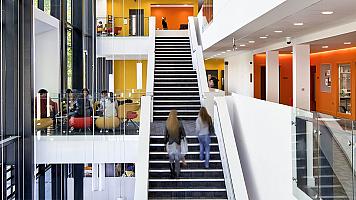BA (Hons)
Economics
Content navigation menu
Why study BA Economics at Goldsmiths
This degree offers you rigorous training in economic theory with real-world applications. It will help you develop your own perspective to stand out from the crowd.
- This degree is unique because it presents a pluralist view of the economy. We provide formal and rigorous training in economics and its different schools of thought, giving you a comprehensive perspective.
- We’ll help you develop your own perspective on the economy, which will make you stand out from the crowd.
- You’ll learn to evaluate arguments and evidence from different sources, as well as use different theories and concepts together with quantitative methods, to formulate and address questions about crucial real-world problems.
- Our graduates start careers in a wide range of jobs including in consultancy, finance, data analysis, government, and creative industries.
- Through the Turing Scheme, you can spend half of your third year at a university in Europe. You'll experience a different culture and academic environment, and you'll have the option of learning or improving a foreign language.
- You'll be part of the Institute of Management Studies, which is highly interdisciplinary and has academics researching not only in economics and political economy, but also in consumer theory, management, business psychology, strategy, innovation and entrepreneurship.
- We focus our teaching efforts on a small cohort of students per year. By doing so, we give you the opportunity to interact a lot with lecturers and other students.
- You’ll learn in small groups and will be assigned a personal tutor for the three years of your programme. Your tutor will meet regularly with you, follow your progress, and help you whenever you need. See what our students say about the small-group teaching environment.
Contact the department
If you have specific questions about the degree, contact Dr Ivano Cardinale.
UCAS code
L1M9
Entry requirements
A-level: BBB
BTEC: DDM
IB: 33 points overall with three HL subjects at 655
Length
3 years full-time
Fees
Home - full-time: £9250
International - full-time: £19640
Department
Watch videos about your course
What you'll study
Year 1 (credit level 4)
In your first year, you'll take the following compulsory modules:
| Module title | Credits |
|---|---|
| Introductory Economics | 30 credits |
| Economic Reasoning | 15 credits |
| Interdisciplinary Perspectives on the Economy | 15 credits |
| Mathematics for Economics and Business | 30 credits |
| Identity, Agency & Environment 1 | 15 credits |
| Identity, Agency & Environment 2 | 15 credits |
Note about optional modules (if available): The above is indicative of the typical modules offered, but is not intended to be construed or relied on as a definitive list of what might be available in any given year. The module content and availability is subject to change.
Teaching style
This programme is taught through scheduled learning - a mixture of lectures, seminars and computer labs. You’ll also be expected to undertake a significant amount of independent study. This includes carrying out required and additional reading, preparing topics for discussion, and producing essays or project work.
How you'll be assessed
You’ll be assessed by a variety of methods, depending on your module choices. These include coursework, examinations, group work and projects.
Entry requirements
We accept the following qualifications:
A-level: BBB
BTEC: DDM
International Baccalaureate: 33 points overall with three HL subjects at 655
Access: Pass with 45 Level 3 credits including 30 Distinctions and a number of merits/passes in subject-specific modules
Scottish qualifications: BBBBC (Higher) or BBC (Advanced Higher)
European Baccalaureate: 75%
Irish Leaving Certificate: H2 H2 H2 H2
Alternative qualifications
See our full list of undergraduate entry qualifications.
We welcome students with a range of educational experiences. If you believe you may not meet the standard qualification requirements we would still encourage you to apply because we consider all aspects of your application when making a decision.
We’ll pay particularly careful attention to your personal statement, which is your opportunity to demonstrate your interest in the subject you’ve applied for. Your referees are also welcome to include any relevant contextual comments around your academic achievements. We’ll look at all these things when making a decision on your application, as well as your qualifications and grades, and may still be able to offer you a place.
International qualifications
We also accept a wide range of international qualifications. Find out more about the qualifications we accept from around the world.
If English isn’t your first language, you will need an IELTS score (or equivalent English language qualification) of 6.0 with a 6.0 in writing and no element lower than 5.5 to study this programme. If you need assistance with your English language, we offer a range of courses that can help prepare you for degree-level study.
Fees and funding
Annual tuition fees
These are the UG fees for students starting their programme in the 2024/2025 academic year.
- Home - full-time: £9250
- International - full-time: £19640
If your fees are not listed here, please check our undergraduate fees guidance or contact the Fees Office, who can also advise you about how to pay your fees.
It’s not currently possible for international students to study part-time if you require a Student Visa, however this is currently being reviewed and will be confirmed in the new year. Please read our visa guidance in the interim for more information. If you think you might be eligible to study part-time while being on another visa type, please contact our Admissions Team for more information.
If you are looking to pay your fees please see our guide to making a payment.
Funding opportunities
We offer a wide range of scholarships and bursaries, and our careers service can also offer advice on finding work during your studies. Find out more about funding your studies with us.
Additional costs
In addition to your tuition fees, you'll be responsible for any additional costs associated with your course, such as buying stationery and paying for photocopying. You can find out more about what you need to budget for on our study costs page.
There may also be specific additional costs associated with your programme. This can include things like paying for field trips or specialist materials for your assignments. Please check the programme specification for more information.
What our students say


Careers
Getting you ready for work
We have a dedicated member of staff who supports and guides students with employability, preparing for job searches and mentoring activities.
We believe employability should be an integral part of your time with us. We work with you to help you discover the kind of role that might be right for you, how to access those opportunities and then how to market yourself effectively into the role.
Two of our second-year modules are directly aimed at increasing your employability: Developing an Employability Strategy and the Work Placement Module, which gets you real-life industry experience.
Our well-rounded students go into a wide range of roles across different industries – traditional economist roles such as finance, investment banking, the civil service, development agencies and economic consulting, but also some that go on to diverse employers such as Warner Music Group, The Ministry for Justice, marketing agencies and even starting their own business.
At the IMS, we have:
- A dedicated Head of Careers and Employability.
- An exclusive module on 'My Career Strategy' that prepares you for the job market.
- Practical workshops and one-to-one sessions covering time management, CV clinics, and transferable skills.
- Students can engage in summer placements and internships between their second and third years.
- Internships: 4-12 weeks duration, typically at corporate firms, with full training, mentoring, and potential graduate offers.
- Placements: Often available in local companies and SMEs, which can be paid or unpaid, less formal and structured. - IMS Career Mentorship Scheme for undergraduates, pairing them with industry partners in London for career mentoring.
- Career Clubs and Societies provide networking and professional development opportunities. Clubs include the Economics Society, Marketing Society, Women in Business Careers Club, and Finance, Investment, and Trading Careers Club.
Find out more about we help you improve your employability while at Goldsmiths
Skills
This degree equips you with an array of skills that will help you stand out in the marketplace and launch your career. Through our modules you will learn economic theory and application, and practise your skills in writing, presenting and data analysis.
The structure of this programme of studies also equips you with:
- An ability to explain economic ideas to non-economists in government and the business world
- A knowledge of the limits of economic models for analysing real-world data
- An understanding of the economy that can meet new challenges and unforeseen crises
- A personal philosophy of how the economy works that distinguishes you from the crowd
You'll also gain skills in teamwork, time management, organisation, critical thinking, reflection and independent research.
All of these skills are greatly sought after by graduate employers.
Facilities
We are proud to be associated with the Goldsmiths’ Library of Economic Literature, which is the main collection in Economics literature in Senate House Library. This is one of the most important libraries in the history of economics and business in the world.
Find out more about the Library's History on the University of London website.
Research
The Institute of Management Studies is highly interdisciplinary and has academics researching not only in Economics and Political Economy, but also in Consumer Theory, Management, Business Psychology, Strategy, Innovation and Entrepreneurship.
Economics lecturers at Goldsmiths have recently completed a project called Economics: Past, Present and Future, a website produced used across universities in the UK that features interviews with celebrated economists such as Sheila Dow, Geoff Harcourt, Charles Goodhart, Tony Lawson, Julie Nelson, Ha-Joon Chang, K Vela Velupillai, Anwar Shaikh and Jayati Ghosh.





